Spotlight Series
Celebrating International Women's Day and Women’s History Month with the Pulte Institute
International Women’s Day 2024 was centered on the theme, ‘Count Her In: Accelerating Gender Equality Through Economic Empowerment.’ The topic aligns with the UN’s 68th session of the Commission on the Status of Women and calls for ensuring equal opportunity for women and girls to strengthen their capacity to learn, earn, and lead.
March is also Women’s History Month, a time to celebrate the Pulte Institute’s partners — over 100 women worldwide engaged in research and contributing evidence-based solutions to important global issues. With IWD 2024, the Pulte Institute reaffirmed its commitment to driving gender equality for a fairer, balanced, and better working world.
We connected with some of our global partners on their professional and personal passions and how they integrate a gender lens into policies, programs, and practices to introduce and promote equality of opportunity.
Investing in Women: A Human Rights Issue
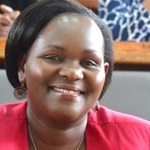
>> Hear more insights from SHARE partner Hellen Inyega
Gender equality is a critical and ongoing human rights challenge. Despite progress in many areas, significant disparities exist between men and women in various aspects of life, including representation in decision-making processes. Stereotypes and societal expectations can limit women in pursuing their interests and potential, says SHARE (Supporting Holistic and Actionable Research in Education) partner Hellen Inyega, Ph.D. (The Pulte Institute is collaborating with Inyega on the LITES Study, which is seeking to fill knowledge gaps in language acquisition by generating evidence surrounding language of instruction transitions.) Inyega serves as an associate professor of language, literacy, and special and early childhood education, teaching courses at all levels of the Kenyan education system at the University of Nairobi.
“I remember going to my department chair and saying, ‘I want to introduce a program on literacy and reading,’ and he asked me, ‘Reading what?’ Because my department chair and university did not quite understand, I veered out of academia into the development world, where I thought my skills were readily needed.
“I had to go out and come back in with a grant. Then, my department chair began listening. He understood this ‘reading thing’ was important. Increasingly, I have drawn in more department members to understand literacy. It’s critical. If your children are not reading well, the future is bleak.
“Women are the engines that drive any country’s development. Never mind that we may drive from behind the scenes. So, having this day to celebrate women’s input and unique contribution to development is essential.
“It helps women look inward and outward to role models. There is a chain reaction when women mentor each other. We must celebrate our successes and appreciate who women are and the unique contributions we bring to global development.”
Microfinance with a Gender Focus
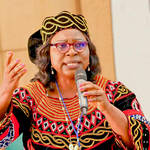
>> FLARE partner Honourine Wainachi Nengtoh
Facilitating informal savings clubs is a strategic approach to empowering women economically, says Honourine Wainachi Nengtoh, a FLARE (Forests & Livelihoods: Assessment, Research and Engagement) partner, environmental activist, and member of Cameroon’s parliament. Nengtoh has created several njangis, or informal savings clubs, between small groups of women. Each person periodically contributes to a common fund, with the total disbursed to a single member. Each time, the recipient changes so that, eventually, all members are recipients, and no one makes a profit.
The njangis Nengtoh oversees are tailored to participants’ specific needs. This flexibility allows women to design savings plans to suit their individual circumstances, such as irregular income patterns, seasonal variations, and entrepreneurial ventures. Nengtoh says funds have been used to start small businesses, agricultural projects, and other income-generating activities.
"Enabling these groups has been my strategic approach to empowering women economically. The women receive training on capacity-building components that enhance their financial knowledge and skills. When faced with emergencies or unexpected expenses, the women can rely on the support from these njangis.'
"Also, the relationships formed within these groups extend beyond financial matters. It's a social capital network that women can leverage for various reasons, and it has led to economic empowerment in household income and improved women's living standards."
Gender Mainstreaming in Global Development Work
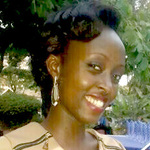
>> Listen to insights from SHARE partner Angella Atukunda
As the director of resilience at ResilientAfrica Network (RAN), Atukunda advocates for gender-sensitive policies and practices that address disparities in global development. Her journey, marked by the determination to ensure equal opportunities, is a testament to her belief that “I have to work with male partners but not below them.”
RAN is a partnership funded by USAID of 20 African universities in 13 countries that “strengthens the resilience of communities by nurturing and scaling innovations.” RAN is also a strategic SHARE (Supporting Holistic and Actionable Research in Education) collaborator, a project managed by the Pulte Institute that helps the U.S. Government determine how to effectively address billions of dollars of funding to global education, a major catalyst in the fight against poverty.
Historically, Atukunda says, global development has been characterized by a gender imbalance, with men often occupying more leadership positions and having greater representation in decision-making roles. Projects like SHARE's LITES research study are changing that.
As one of SHARE's implementing partners, Atukunda says she’s empowered to participate in all aspects of this work. “When you’re a woman in SHARE,” she says, “You’re supported to achieve more. We have platforms where we talk about our work, woman-to-woman."
Celebrate Colleagues' Achievements
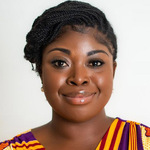
Women who encourage and build up one another create more inclusive and encouraging workplaces, fostering personal and collective growth, says 2023 Mandela Washington Fellowship at the University of Notre Dame alum Beatrice Schultz.
Schultz, who hails from Swakopmund, a coastal city in Namibia, says we must recognize the power of community, our environments, and the power to demand respect for the faculties of our minds.
With her Ignite Talk in Washington, D.C., last August, Schultz encourages us “to work together to create a future that allows for collaboration, inclusion, diversity, and equity" and to "bask in the glow of each other’s accomplishments."
“Understanding when the person next to you is shining," Schultz says, "means you are glowing too. It is shifting your mindset to understand that we are a community and we were designed to flourish and work together as a unit.”
The Opportunity of Adversity
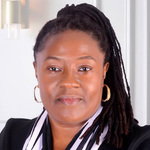
>> ERIE Conflict and Violence Prevention Evaluation partner Elizabeth 'Lizzy' Jeiyol
In Benue State, Nigeria, Elizabeth 'Lizzy' Jeiyol founded the charity Gender and Environmental Risk Reduction Initiative. Raised by a mother who defied conventional expectations, Lizzy was instilled with a sense of purpose and a questioning mind, which juxtaposed the stark gender disparities in their community. It laid the groundwork for her future endeavors.
Lizzy's academic pursuits in geography and environmental studies pushed her to pursue global development work, focusing on human-environmental interactions research from a gendered perspective. Her efforts to hold communities accountable for changing their health, hygiene, and sanitation behaviors underscore her belief in education as a catalyst for societal advancement. She believes equipping women with knowledge and involving them in environmental stewardship and community development is essential for creating a more equitable and sustainable future.
Lizzy shares how her organization faces operational challenges, particularly in conflict-affected areas. The security situation significantly hampers their efforts to aid communities in crisis, with women and children often enduring the greatest hardships.
By aligning with the Sustainable Development Goals (SDGs), Lizzy and her team provide robust, well-tailored, and longer-term support to help at-risk women achieve macroeconomic stability. Lizzy's story reflects resilience, hope, and the collective power to surmount adversity, advocating for a world where no one is left behind.
Supporting Changemakers
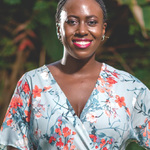
>> SHARE partner Damalie Nsangi
Creating inclusive and supportive environments contributes to the empowerment of women and the positive impact they can make, says Damalie Nsangi, a SHARE (Supporting Holistic and Actionable Research in Education) partner and monitoring and evaluation program manager with ResilientAfrica Network (RAN). Nsangi tells how her first boss provided invaluable mentorship, training, and networking opportunities to help her build connections, share experiences, and access valuable resources. Nsangi says she is now 'paying it forward.'
“My boss made it a point to give me challenging tasks and to let me know that I was good enough — and she let me go and try things out. When I got stuck, I would ask her for solutions, and she said, ‘What do you think? How can we come up with a solution?'
“She made it a point to mentor me, to teach me about the field of monitoring and evaluation, to isolate errors and promote successful mechanisms for current and future projects.’
“It directly affected the kind of leader that I am. Because of her, I make it a point to empower the people I lead.”
'The Present is the Future We Once Dreamed Of'

Irene Palma, executive director and founder of the Instituto Centroamericano de Estudios Sociales y Desarrollo (INCEDES), has seen progress first-hand. While acknowledging the challenges that Guatemalan youth still face ― gender discrimination, a small and underfunded research ecosystem, and a historical economy that promotes migration ― Irene expresses joy at the prospect of young women leading the charge toward the current transformation of the political, social, and academic landscape in her country. "My eyes have seen young and empowered women ― many of them Indigenous ― leading social movements and guiding their communities. I never thought I would ever experience that."
Irene says, "The present is the future Guatemalan youth once dreamed of." As a student, Irene fought to find her way into social research, a predominantly male-dominated field. Now, at INCEDES and other research and government institutions in Guatemala and beyond, she is a professor and mentor for young women, men, and LGBTQI+ students whom Irene encourages to become empowered and autonomous researchers. "I want them to walk beside me, not behind me," she says.
Irene says her parents were role models. Her mother became a lawyer in her later years and worked tirelessly to help women who suffered gender-based violence. Her father had a deep commitment to gender equality and taught her to be conscious of her social responsibility.
Irene is convinced that a circular model of migration ― allowing migrants to leave and return to Guatemala in pre-established and consistent periods ― could solve most, if not all, the social and political problems related to the issue. As most migrants are men, women have been left behind in their communities, taking care of economic life and aspects previously attended only to by men. "Women have become the mentors of their communities," Irene says.
She looks forward to a bright future for young Guatemalans. Still, she says it will require the participation of all sectors of Guatemalan society: the governmental and private sectors, the Indigenous and non-Indigenous population, men and women, LGBTQI+ and non-LGBTQI+ people, and old and young researchers. "The world is interconnected," Irene says. "The U.S. and Guatemala are partners in constructing a social welfare system for all."